unit7-8知识梳理
8年级(下)Units 7~8---中考英语复习教材核心词汇知识点精讲精练(人教版)
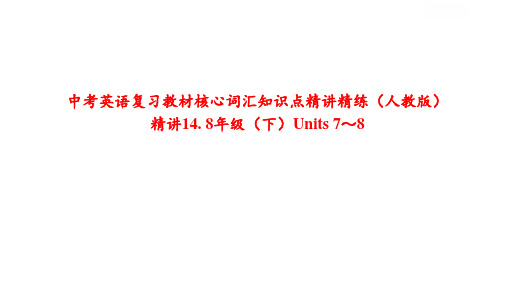
_f_o_rc_e_
11. 大海; 海洋n.
_o_ce_a_n_
12. 成年的; 成人的adj. 成人; 成年动物n.
_a_d_u_l_t
13. 野生的adj.
_w_i_ld_
14. 政府; 内阁n.
_g_o_v_e_r_n_m_e_n_t_
15. 油; 食用油; 石油n.
_o_i_l
16. 巨大的; 极多的adj.
【短语快译】
1. (可以)随便(做某事)
_fe_e_l_f_r_e_e
2. 据我所知
_a_s_f_a_r_a_s_I__k_n_o_w_
3. 吸入; 吞入(体内)
_ta_k_e__in_
4. 面对(问题、困难等)
_in__th_e__f_a_ce__o_f
5. 即使; 虽然
_e_v_e_n_t_h_o_u_g_h_
中考英语复习教材核心词汇知识点精讲精练(人教版) 精讲14. 8年级(下)Units 7~8
基础梳理 夯实竞争力
【核心词汇】 1. 平方; 正方形n. 2. 米 ; 公尺n. 3. 深的; 纵深的adj. 4. 沙漠n. 5. 人口; 人口数量n. 6. 墙n. 7. 古代的; 古老的adj. 8. 厚的; 浓的adj.
【直击考点】
( D )1. (2020·孝感中考)—Dear friends, do you still remember why you
came here three years ago?
—To______ our dreams!
A. copy
B. save
C. imagine
D. achieve
【核心归纳】
【考点3】辨析achieve与come true 课本原句 The spirit of these climbers shows us that we should never give up trying to achieve our dreams. 这些登山者的精神向我们表明我们应该永不放弃实现我们的梦想。 (Unit 7, P51)
湘少版英语五年级上册 Unit 7 -8知识梳理

Unit 7 What time do you get up一、核心词汇★★★1.关于学科的词汇PE体育art美术music音乐maths数学2.其他词汇timetable时间表computer 电脑lesson 课3.短语get up起床go to bed上床睡觉二、了解词汇★★dining hall餐厅;饭厅in the office在办公室have a rest休息the whole afternoon整个下午what time什么时间go home回家computer lesson微机课drive to work开车上班三、核心句型★★★- What time do you get up? 你几点起床?- I get up at 6:50. 我6:50起床。
解读:问句是一个询问时间的特殊疑问句。
举一反三: -What time do you go to the bookstore? 你几点去书店?- At 8:00 a.m. 上午8:00。
四、了解句型★★1. I have dinner at 7:00 p.m. 我晚上7:00吃晚餐。
解读: 此句常用来表达在某个时间做某事。
举一反三: We play basketball at 4:00 p.m. 我们下午4:00打篮球。
2. He drives to work at 7 o’clock. 他7点钟开车上班。
At 9:00 a. m., he begins to work on his computer. 上午9点,他开始在他的电脑上工作。
解读: 这两句是表达某时间做某事的陈述句。
举一反三: My mother goes to work at 7:00. 我妈妈7点钟去上班。
I play football at 9:30 a.m. 我上午9:30踢足球。
Unit 8 Lingling helps her parents一、核心词汇★★★1. 表示动作的实义动词make整理(床铺等) iron熨烫clean把……弄干净water……浇水wash洗2.其他词汇parent父亲;母亲meal 一餐plant植物二、了解词汇★★1.表示动作的词汇help帮助cook烹饪sweep扫;打扫2.其他词汇often经常him他(宾格) floor 地板together 在一起dish 盘;碟3.动词短语make the bed整理床铺iron the clothes熨烫衣服clean the windows 擦窗户cook a meal做饭wash the vegetables 洗蔬菜water the plants 给植物浇水his parents他的父母sweep the floor 扫地work together 一起工作wash the dishes洗盘子三、核心句型★★★What do you do at home? 你在家里做什么?解读: 此句是what引导的含有实义动词的一般现在时的特殊疑问句。
人教版八年级上册英语unit7-unit8重点知识点

He often helps his mother with housework at home.
= He often helps his mother(to)do housework at home.
8.But many scientistsdisagree withቤተ መጻሕፍቲ ባይዱr.White.(P53)
4.句型变化(变否定句和一般疑问句):
★否定句:把肯定句中的will后加not(或缩写成won't)即可。
Eg: Wewon'tvisit the old man next week.
Shewon'tfinish the work in 2 weeks.
★一般疑问句:把肯定句中的will提到句首即可。
8. There _____ a great concert in the theatre next Saturday evening.
A. will beB. will haveC. hasD. is going to have
Unit 8 How do you make a banana milk shake?
6. --- Mom, could you get me a pair of new sports shoes. This pair ________.
--- No problem. I’m checking in Taobao right now.
A. went offB. got out of shapeC. cut outD. ran out
问价钱
例:Howmuch is your coat?
问程度(多么……)
例:Youcan’t imagine how much I like it.
七年级上册英语七八单元知识点总结

七年级上册英语七八单元知识点总结一、七年级上册英语七八单元的重点单词1. school2. library3. cafeteria4. playground5. gym6. science7. math8. art9. music10. geography二、七年级上册英语七八单元的重点短语1. go to school2. have lunch3. play basketball4. do homework5. listen to music6. draw pictures7. study English8. read books9. write an em本人l10. sing a song三、七年级上册英语七八单元的重点语法1. 一般现在时例句:I go to school every day.2. 一般过去时例句:I played basketball yesterday.3. 一般将来时例句:I will do my homework tomorrow.4. 介词in,on,at的用法例句:I have art class on Mondays.5. 形容词的比较级和最高级例句:I am taller than my brother.6. be动词的用法例句:She is a science teacher.四、七年级上册英语七八单元的重点句型1. What do you do on weekends?答句:I play basketball on weekends.2. What does she like?答句:She likes music.3. How often do you study English?答句:I study English every day.4. Where is the library?答句:The library is next to the cafeteria.5. When does the art class start?答句:The art class starts at 2 o'clock.五、七年级上册英语七八单元的重点阅读材料1. My School介绍学校的情况,包括教室、图书馆、操场等地方。
初中中考英语总复习讲义课件 教材复习 九年级全册Units 7-8
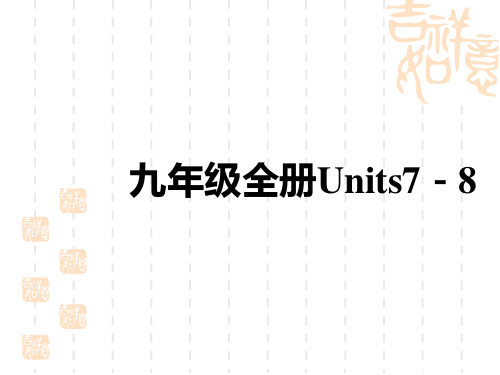
8.sleepv.&n.→sle_e_p_y____adj.困倦的;瞌睡的 9.suitv.→s_u_i_ta_b_l_e__adj.合适的;适当的 10.medicaladj.m→e_d_ic_i_n_e____n.药;医学
重点句 型 1.Ishouldnotbeto_l_d___w_h_a_t____todo!
hood... 一定有什么东西光顾了我们小区各家……(Unit8P59)
【点拨】 “Therebe+名词(人或物)+doingsth.+地 点状语”表示“某处有某人(物)正在做某事”。 “Theremust/maybe+名词(人或物)+doingsth.+地 点状语”表示“某处肯定/可能有某人(物)正在做某 事”。如: Theremustbenostudentsstudyingintheclassroomnow. 现在一定没有学生在教室里学习。
2 . (2020·济 南 莱 芜 区 改 编 )WhenIwalkedpastthepark ,
Isawsomdoeoinldgpeople_________(do) ChineseTaiji.
考点
4 Theremustbesomethingvisitingthehomesinourneighbor
2.—
Doyouthinkteenagersshouldbeencouragedtomaketheirow
ndecisions?
你认为青少年应该被鼓励自己做决定吗?
—No
,
Idon'tagreewiththis.Teenagersaretooyoungtomaketheirow
ndecisions.
学以 致用 1.— Didyoutalkbacktoyourparentswhenyouwdeorienagchild?
人教版高二(上)英语知识清单:重点短语和重点句子unit7-8(人教版高二英语上册教案教学设计)
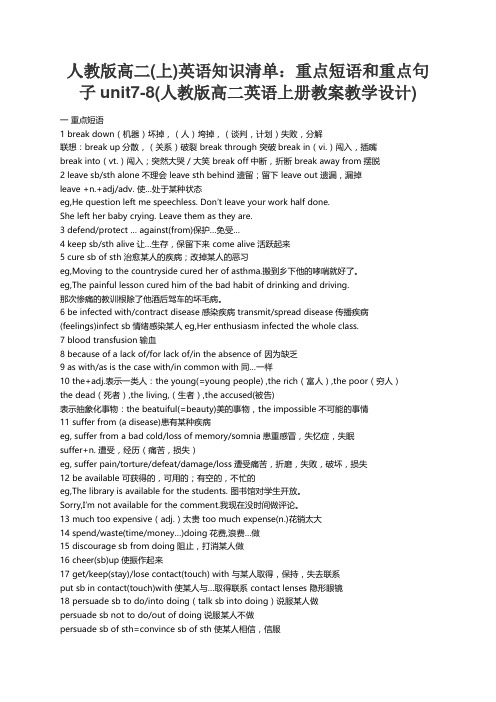
人教版高二(上)英语知识清单:重点短语和重点句子unit7-8(人教版高二英语上册教案教学设计)一重点短语1 break down(机器)坏掉,(人)垮掉,(谈判,计划)失败,分解联想:break up分散,(关系)破裂 break through 突破break in(vi.)闯入,插嘴break into(vt.)闯入;突然大哭/大笑 break off中断,折断 break away from摆脱2 leave sb/sth alone不理会 leave sth behind遗留;留下 leave out 遗漏,漏掉leave +n.+adj/adv. 使…处于某种状态eg,He question left me speechless. Don’t leave your work half done.She left her baby crying. Leave them as they are.3 defend/protect … against(from)保护…免受…4 keep sb/sth alive让…生存,保留下来 come alive活跃起来5 cure sb of sth 治愈某人的疾病;改掉某人的恶习eg,Moving to the countryside cured her of asthma.搬到乡下他的哮喘就好了。
eg,The painful lesson cured him of the bad habit of drinking and driving.那次惨痛的教训根除了他酒后驾车的坏毛病。
6 be infected with/contract disease感染疾病 transmit/spread disease传播疾病(feelings)infect sb情绪感染某人eg,Her enthusiasm infected the whole class.7 blood transfusion输血8 because of a lack of/for lack of/in the absence of 因为缺乏9 as with/as is the case with/in common with同…一样10 the+adj.表示一类人:the young(=young people) ,the rich(富人),the poor(穷人)the dead(死者),the living,(生者),the accused(被告)表示抽象化事物:the beatuiful(=beauty)美的事物,the impossible不可能的事情11 suffer from (a disease)患有某种疾病eg, suffer from a bad cold/loss of memory/somnia患重感冒,失忆症,失眠suffer+n. 遭受,经历(痛苦,损失)eg, suffer pain/torture/defeat/damage/loss遭受痛苦,折磨,失败,破坏,损失12 be available 可获得的,可用的;有空的,不忙的eg,The library is available for the students. 图书馆对学生开放。
2021-2022学年人教版八年级英语上册Unit 7--8单元知识点汇总
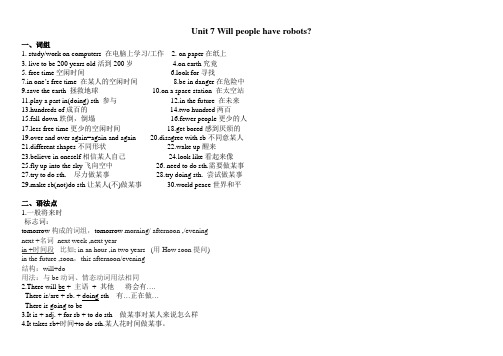
Unit 7 Will people have robots?一、词组1. study/work on computers 在电脑上学习/工作2. on paper在纸上3. live to be 200 years old活到200岁4.on earth究竟5. free time空闲时间6.look for寻找7.in one’s free time 在某人的空闲时间8.be in danger在危险中9.save the earth 拯救地球10.on a space station 在太空站11.play a part in(doing) sth 参与12.in the future 在未来13.hundreds of成百的14.two hundred两百15.fall down跌倒,倒塌16.fewer people更少的人17.less free time更少的空闲时间18.get bored感到厌烦的19.over and over again=again and again 20.disagree with sb不同意某人21.different shapes不同形状22.wake up醒来23.believe in oneself相信某人自己24.look like看起来像25.fly up into the sky飞向空中26. need to do sth.需要做某事27.try to do sth. 尽力做某事28.try doing sth. 尝试做某事29.make sb(not)do sth让某人(不)做某事30.world peace世界和平二、语法点1.一般将来时标志词:tomorrow构成的词组,tomorrow morning/ afternoon ,/eveningnext +名词next week ,next yearin +时间段比如; in an hour ,in two years (用How soon提问)in the future ,soon,this afternoon/evening结构:will+do用法:与be动词、情态动词用法相同2.There will be + 主语+ 其他将会有….There is/are + sb. + doing sth 有…正在做…There is going to be3.It is + adj. + for sb + to do sth 做某事对某人来说怎么样4.It takes sb+时间+to do sth.某人花时间做某事。
Unit7-Unit8知识点汇总(知识清单)-2023-2024学年译林版英语四年级上册
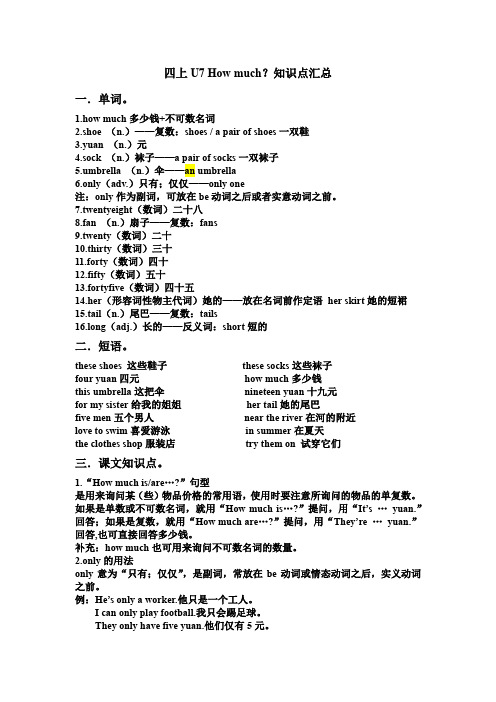
四上U7 How much?知识点汇总一.单词。
1.how much多少钱+不可数名词2.shoe (n.)——复数:shoes / a pair of shoes一双鞋3.yuan (n.)元4.sock (n.)袜子——a pair of socks一双袜子5.umbrella (n.)伞——an umbrella6.only(adv.)只有;仅仅——only one注:only作为副词,可放在be动词之后或者实意动词之前。
7.twentyeight(数词)二十八8.fan (n.)扇子——复数:fans9.twenty(数词)二十10.thirty(数词)三十11.forty(数词)四十12.fifty(数词)五十13.fortyfive(数词)四十五14.her(形容词性物主代词)她的——放在名词前作定语her skirt她的短裙15.tail(n.)尾巴——复数:tails16.long(adj.)长的——反义词:short短的二.短语。
these shoes 这些鞋子these socks这些袜子four yuan四元how much多少钱this umbrella这把伞nineteen yuan十九元for my sister给我的姐姐her tail她的尾巴five men五个男人near the river在河的附近love to swim喜爱游泳in summer在夏天the clothes shop服装店try them on 试穿它们三.课文知识点。
1.“How much is/are…?”句型是用来询问某(些)物品价格的常用语,使用时要注意所询问的物品的单复数。
如果是单数或不可数名词,就用“How much is…?”提问,用“It’s …yuan.”回答;如果是复数,就用“How much are…?”提问,用“They’re …yuan.”回答,也可直接回答多少钱。
(完整版)译林版英语四年级下册Unit7-8单元知识点
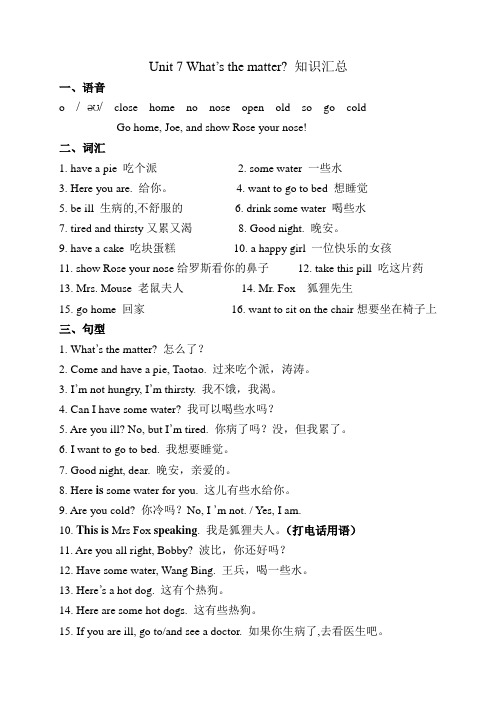
Unit 7 What’s the matter? 知识汇总一、语音o / əʊ/close home no nose open old so go coldGo home, Joe, and show Rose your nose!二、词汇1. have a pie 吃个派2. some water 一些水3. Here you are. 给你。
4. want to go to bed 想睡觉5. be ill 生病的,不舒服的6. drink some water 喝些水7. tired and thirsty又累又渴8. Good night. 晚安。
9. have a cake 吃块蛋糕10. a happy girl 一位快乐的女孩11. show Rose your nose给罗斯看你的鼻子12. take this pill 吃这片药13. Mrs. Mouse 老鼠夫人14. Mr. Fox 狐狸先生15. go home 回家16. want to sit on the chair想要坐在椅子上三、句型1. What’s the matter? 怎么了?2. Come and have a pie, Taotao. 过来吃个派,涛涛。
3. I’m not hungry, I’m thirsty. 我不饿,我渴。
4. Can I have some water? 我可以喝些水吗?5. Are you ill? No, but I’m tired. 你病了吗?没,但我累了。
6. I want to go to bed. 我想要睡觉。
7. Good night, dear. 晚安,亲爱的。
8. Here is some water for you. 这儿有些水给你。
9. Are you cold? 你冷吗?No, I ’m not. / Yes, I am.10. This is Mrs Fox speaking. 我是狐狸夫人。
初中中考英语总复习讲义课件 教材复习 8年级上册Units 7—8
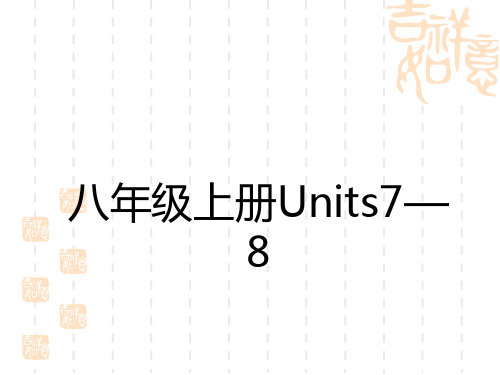
第一人称(I/we)时,宾语从句通常要“否定前移”,即把从句中的否定转
移到主句中来。如: [此类动词还有think/suppose/expect/imagine] I don't believe he will come.我认为他不会来。
soallhisfriends________whathesays. ▪ 3.Ifybeolieuve_in__________yourself,
youcansucceed.
▪ However, theyagreeitmaytakehundredsofyears.然而, 他们同意那可能会花费数百年的时间。
Webelieveinhimbecausehehasneverletusdown.
▪ ___________________________________ __________________
▪ believe believein ▪ 2.(2021·河池改编)Tomisanhonestboy,
believe
时间。
▪ Therewillbemorepollution.将会有更多的污染。 (Unit7P50)
▪ 【辨析】fewer,less与more
单词 含义
用法
例句
few 的比较级,修饰可数名 There will be fewer trees.
fewer 词复数。
将会有更少的树木。
更少
little 的比较级,修饰不可数 We can use less water.我
(Unit7P53)
▪ 【点拨1】agree意为“同意;赞成;应允”, 其常见用法如下:
七年级英语上册Unit7-8重点、考点知识总结

Unit 7 How much are these socks?1、短语归纳①how much 多少钱②seven dollars 七美元③white bag 白色的包④ clothes store 服装店⑤at very good prices 以很低的价格⑥ for boys 对于男孩子⑦ skirts in red 红色的裙子⑧ twenty-eight dollars 28美元⑨ Big Sale! 大降价!⑩ twenty yuan 二十元⑾ a pair of black shoes 一双黑色的鞋子2、重点句型①—how much is/are …? ……多少钱?—It’s /They’re … 它/它们……②I’ll take it. 我买了。
③ in+颜色某种颜色的衣服。
What color do you want? 你想要什么颜色的?④buy sth from sb. 从某人那买某物。
⑤sell sth to sb. 把某物卖给某人。
⑥Here you are. 给你。
3、典句必背①—How much is the hat? 这顶帽子多少钱?—It’s five dollars. 5美元。
②—How much are these socks? 这双短袜多少钱?—They’re two dollars. 两美元。
③—Can I help you? 我能帮您吗?—Yes, please. 好的。
Here you are. 给你。
I’ll take it. 我买了。
—Thank you.谢谢。
—You’re welcome. 不用谢。
4、重点语法1. 基数词,表示数目或者数量的多少。
基数词的表达法:①one 到twelve,拼写和读音没有什么相似之处,无规律可言,应逐一进行记忆。
②thirteen到nineteen,表示“十几”,在个位数后加后缀-teen,读作/ti:n/。
其中要注意thirteen, fifteen和eighteen的拼写。
新目标英语八年级上册unit_7-unit_8知识点总结
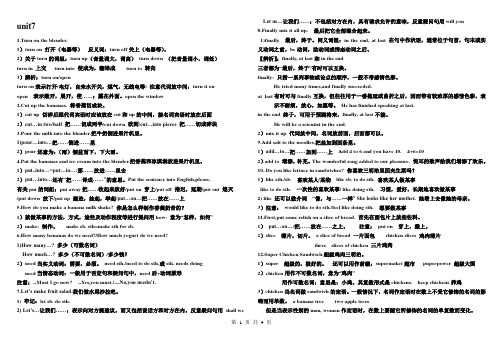
1.Did you go to the zoo?
1)Did you……?你做……了吗?是过去时态的一般疑问句,用于询问别人在过去某一时间是否做了某事。—Did you visit Mr Wang last Sunday? ----Yes,we did.
2)did做助动词,一般用于一般过去时态的疑问句及其答语和否定句中,相当于一般现在时中的do和does.在句中没有实际意义,只用来帮助完成疑问句和否定句。
other也是“其他的,别的”意思,但other是形容词,用来修饰名词时,需放在名词之前。
5.Did you win that hat?你赢了那顶帽子了吗?
辨析:win/beat
win通常跟a game, a war, a prize之类的词。beat后跟人。
6.Class 9 had a great time on the school trip.九班的学生在学校旅行中过的很愉快。
help sb. with sth.=help sb.(to) do sth.帮助某人做某事
16.First,check you have all the ingredients.首先,检查一下你是否有所有的配料。
1)check动词:检查,核对。check one’s answers
2) check名词:支票,账单。
/put down放下/put up建造,挂起,举起/put…on…把……放在……上
5.How do you make a banana milk shake?你是怎么样制作香蕉奶昔的?
1)就做某事的方法,方式,途径及动作程度等进行提问用how:意为“怎样,如何”
2)make:制作。make sb. sth=make sth for sb.
2020年陕旅版五年级英语上册Unit7-8知识点梳理

Unit 7 She Looks Tall and Thin一、单元单词(16个)·thin[θɪn] / adj.瘦的He was a tall, thin man with gray hair.(他是个瘦高个,头发灰白。
)·aunt[ɑ:nt] / n.姨;姑;婶;伯母;舅母It was a present from Aunt Vera.(这是薇拉姑妈送的礼物。
)·uncle[ˈʌŋkl] / n.伯;叔;舅;姑父;姨夫I love to play video games with my uncle.(我喜欢和叔叔一起玩电子游戏。
)·kid[kɪd] / n.小孩The little kid likes to play in the park.(这个小孩喜欢在公园里玩耍。
)·friend[frend] / n.朋友I was riding on the back of a friend's bicycle.(我当时坐在一个朋友的自行车后座上。
)·strong[strɒŋ] / adj.强壮的I feared I wouldn't be able to control such a strong horse.(我怕我驾驭不了这么强壮的马。
)·old[əʊld] / adj.年老的We don't feel old at all.(我们一点都不觉得老。
)·young[jʌŋ] / adj.年轻的The young kitten struggles to climb onto the rope.(这只小猫努力地想爬上绳索。
) ·come from[kʌm frɔm] / 来自Where did you come from?(你打哪儿来?)·a little[əˈlitl] / adv.少量;少许I had grazed my knees a little.(我的膝盖擦破了一点皮。
Unit7--8重点知识点归纳-2021-2022学年七年级英语人教版下册

2022年春人教版七年级英语单元重点知识点归纳Unit 7 It`s raining一、重点词组与句子Section A1.take a message for sb.为某人捎个信2. call sb.back 给某人回电话3. now /right now现在4. have a good (nice / wonderful / great) time/ have fun / enjoy oneself 玩得高兴5 play computer games 玩电脑游戏 6. make soup 做汤1 How`s the weather in Beijing?/What`s the weather like in Beijing. 北京的天气怎样?It`s sunny/rainy/cloudy / snowy / windy. 天气晴朗/下雨/多云下雪/多风.2 How`s your summer vacation going? 你的暑假怎么样?Great / Not bad /Terrible/OK. 很好/不坏/糟糕/还行.3 Sounds like you`re having a good time. 听起来你玩的很开心。
4 Could you just tell him to call me back ? 你能告诉他给我回电话吗?No problem.没问题。
Section B1 sunny and hot 晴朗而炎热2 windy and dry多风而干燥3.be on vacation 在度假4.sit by the pool 坐在池塘旁边5.drink orange juice 喝橘汁6. learn a lot学了很多。
7. just right for walking 正适合步行8. in the rainy weather .在下雨的天气里9. read a book看书10. have a great time doing sth. 做某事玩得很高兴1. I`m having a great time visiting my aunt in Canada. 我正高兴的在加拿大拜访我的姑姑。
人教新目标英语九年级unit7--8知识点总结

知识点归纳总结Unit 7 Teenagers should be allowed to choose their own clothes. Section A1.sixteen-year-olds= sixteen-year-old children 十六七岁的青少年an eight-year-old girl 一个8岁的女孩2.choose—chose—chosen v选择choice n.选择choose one’s own clothes 选择某人自己的衣服choose to do sth 选择做某事make a choice 做选择make one’s own choice 做某人自己的选择have no choice but to do sth 只好做某事,除做某事之外,别无选择3. allow v 允许allow sb to do sth 允许某人做某事allow doing sth允许做某事be allowed to do sth被允许做某事be not allowed to do sth 不被允许做某事should be allowed to do sth 应该被允许做某事should not be allowed to do sth 应该不被允许做某事4. drive v. 驾驶driver n. 司机driver’s license 驾照 =driving license5. worry about=be worried about 担心6.safe adj 安全的–dangerous危险的safety n 安全=safe placessafely adv 安全地7. have/doa part-time(full-time) jobjob C. 零散的具体的工作work U 不指某种具体的工作8.have/get sth+过去分词使得某物被怎么样过去分词的动作往往是别人做的 get one’s ears pierced 使得某人的耳朵被刺穿(打耳洞)have one’s hair cut=cut one’s hair 使得头发被剪(理发)9.serious enough 足够严肃,严谨10.stop to do sth. 停下来去做另一件事stop doing sth. 停止正在做的事11. be excited about sth/doing sth 对做某事感到兴奋/激动be excited to do sth12. need v需要sb need to do sth 某人需要做某事sth need doing sth=sth need to be +过去分词某物需要做某事Must sb to do sth? 某人必须要做某事吗?Yes, sb must. 是的,必须做No ,sb needn’t不,没必要。
人教版初中英语九年级全册7-8知识点梳理

的申请未通过。
(2)regret 作名词,意为“痛惜,懊悔,遗憾,
失望”。如:
It is with great regret that I accept your
resignation. 接受你的辞呈我感到非常遗憾。 She expressed her regret at / over the decision. 她对这个决定表示失望ake part in均可意 为“参加”,具体区别如下图所示:
◆attend vt. 正式用语,指参加会议,婚礼、 葬礼、典礼;去上课、上学、听报告等。句子的
主语只是去听,去看,不一定起积极作用。如:
He’ll attend an important meeting tomorrow. 他明天要参加一个重要的会议。
第一部分
教材知识梳理
九年级(全) Units 7-8
考点精析
考点一 I regret talking back, not listening to Mom. 我
后悔还嘴,没有听妈妈的话。(Unit 7 P51) 【用法归纳】 regret的用法 regret ( v .) →regretted( 过去式、过去分词 )
→regretting (现在分词)“感到遗憾”,表示歉意, 懊悔。
(1)regret 作及物动词,常见用法如下: ◆regret+ n./pron.意为“后悔,对„„表示歉 意”。 如: If you don’t do it now, you’ll only regret it. 如 果现在不做,以后一定会后悔的。 The airline regrets any inconvenience.航空公
说明句子主语参加该项活动并在活动中发挥作用。如:
人教版中考英语教材知识梳理讲义第12讲8年级下册Unit7--8
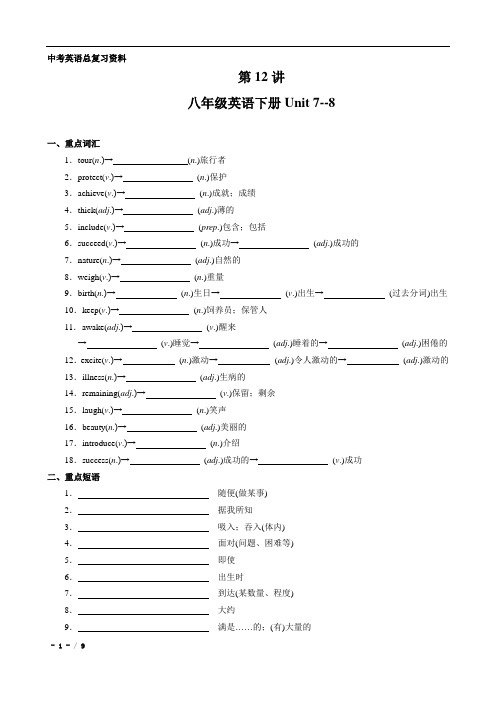
中考英语总复习资料第12讲八年级英语下册Unit 7--8一、重点词汇1.tour(n.)→(n.)旅行者2.protect(v.)→(n.)保护3.achieve(v.)→(n.)成就;成绩4.thick(adj.)→(adj.)薄的5.include(v.)→(prep.)包含;包括6.succeed(v.)→(n.)成功→(adj.)成功的7.nature(n.)→(adj.)自然的8.weigh(v.)→(n.)重量9.birth(n.)→(n.)生日→(v.)出生→(过去分词)出生10.keep(v.)→(n.)饲养员;保管人11.awake(adj.)→(v.)醒来→(v.)睡觉→(adj.)睡着的→(adj.)困倦的12.excite(v.)→(n.)激动→(adj.)令人激动的→(adj.)激动的13.illness(n.)→(adj.)生病的14.remaining(adj.)→(v.)保留;剩余15.laugh(v.)→(n.)笑声16.beauty(n.)→(adj.)美丽的17.introduce(v.)→(n.)介绍18.success(n.)→(adj.)成功的→(v.)成功二、重点短语1.随便(做某事)2.据我所知3.吸入;吞入(体内)4.面对(问题、困难等)5.即使6.出生时7.到达(某数量、程度)8.大约9.满是……的;(有)大量的10.走路时撞着11.摔倒12.照顾13.因……而死14.科幻小说15.赶快16.自从17.属于18.互相19.砍倒20.在……结尾;在……末端三、重点句型1.珠穆朗玛峰比世界上其他任何一座山都高。
Qomolangma is mountain in the world.2.中国是世界上人口最多的国家。
China has in the world.3.这头大象比这只大熊猫重许多倍。
This elephant weighs more than this panda.4.这些幼崽经常死于疾病并且活不了很长时间。
湘少版六年级上册 Unit 7 -8 知识梳理
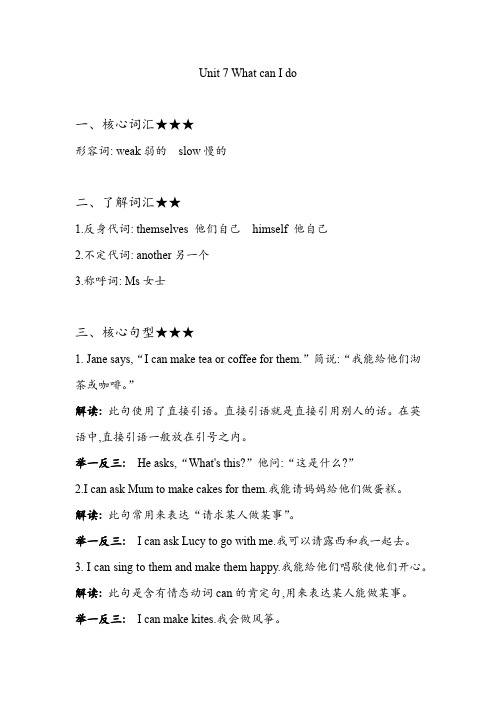
Unit 7 What can I do一、核心词汇★★★形容词: weak弱的slow慢的二、了解词汇★★1.反身代词: themselves 他们自己himself 他自己2.不定代词: another另一个3.称呼词: Ms女士三、核心句型★★★1. Jane says,“I can make tea or coffee for them.”简说:“我能給他们沏茶或咖啡。
”解读: 此句使用了直接引语。
直接引语就是直接引用别人的话。
在英语中,直接引语一般放在引号之内。
举一反三: He asks,“What's this?”他问:“这是什么?”2.I can ask Mum to make cakes for them.我能请妈妈給他们做蛋糕。
解读: 此句常用来表达“请求某人做某事”。
举一反三:I can ask Lucy to go with me.我可以请露西和我一起去。
3. I can sing to them and make them happy.我能給他们唱歇使他们开心。
解读: 此句是含有情态动词can的肯定句,用来表达某人能做某事。
举一反三: I can make kites.我会做风筝。
四、了解句型★★I can help them to get on or off the bus. 我们帮助他们上公共汽车或下公共汽车。
解读: 此句常用来表达能帮助某人做某事。
举一反三: I can help you (to) wash the clothes.我能帮助你洗衣服。
Unit 8 We shouldn't waste water一、核心词汇★★★1.情态动词: should应该shouldn't = should not2.动词: waste 浪费save节约3.名词: blouse女式短上衣drop(一)滴4.形容词: enough 足够的fresh 新鲜的二、了解词汇★★1.名词: earth地球exercise锻炼;练习2.动词: kill杀害litter乱扔废弃物3.形容词: wild野生的三、核心句型★★★1 We should plant more trees.我们应该种更多的树。
Unit 7-8知识重点

Unit 7-8 知识(一)疑问词+不定式=疑问词+陈述句子e.g.I don’t know how to do it.= I don’t know how I should do it.e.g.I don’t know what to do.= I don’t know what I should do .跟踪练习:他正在考虑下一步怎么办。
He is _____ next .= He is _____ _____ he ____________next.(二)run out of 与run outrun out of 与run out都有“用完了”意思,但它们在句中的用法有区别。
1)run out of 意为“用完了”,但强调的是主动行为,主语一般是人。
2)run out 的意思也是“用完了”,表示状况,其主语通常指时间、食物、金钱等,无被动语态。
His money soon ran out .= He ran out of his money soon.Their food ran out in a minute because ofhunger.= They ran out of their food in a minute because of hunger.跟踪联系:1)I’ve run ______ the milk.A.outB. out forC.of outD.out of 2)So far his money ______ . He has to borrow some.A. runs outB. runs out ofC. has run outD.has run out of 3)水尽粮绝后,他不知该怎么做。
After the water and food _____ _____ ,he didn’t know ______to do.4 )His food ran out yesterday.(改为同义句)He _______ _______ _______ his food yesterday.He _____ ______ his food yesterday.(三)Not only do I feel good about helping other people, but I get to spend time doing what I love to do .Not only… but also…若引导两个句子,not only 引导的分句放在句首时要部分倒装。
- 1、下载文档前请自行甄别文档内容的完整性,平台不提供额外的编辑、内容补充、找答案等附加服务。
- 2、"仅部分预览"的文档,不可在线预览部分如存在完整性等问题,可反馈申请退款(可完整预览的文档不适用该条件!)。
- 3、如文档侵犯您的权益,请联系客服反馈,我们会尽快为您处理(人工客服工作时间:9:00-18:30)。
Unit 7 What does he look like?(知识点展开例句例题)1.问外貌(两种问法)look like/ be like2. 学会描述长相a)sb.+ be +adj.[系表结构] She is short/tall/thin/heavy/of medium height/build.b)sb.+ have/ has + n.[自己身上长] She has long curly black hair./eyes/beard/face/build/lookc)sb.+ wear/ wears +[外物] She always wears a red dress./glasses/hat/watchd)用介词with或in+ n.,组成的介词短语作定语。
She is a girl with long curly hair = The girl has long curly hair.She is a girl in red.e)区别tall-short/high-low3.Do you know I have a new friend in Class Five? 联想think4.区分What do you like?5.受到….的欢迎Wang Lin is very popular with people. /冰淇淋很受到孩子们的喜欢。
6.辨析a little, a bit, a little bit, kind of /a little of, a bit of,She’s good-looking but she’s a little bit quiet. /杯子里有一点水。
7.Do you remember Johnny Dean, the pop singer with funny glasses and curly hair?8.He does n’t wear glasses any more.9.辨析talk/ tell/ speak/say10.辨析stop to do sth. / stop doing sth.联想remember/forgeta)你看上去很累。
你最好停下来休息一下。
b)别说话了。
老师来了。
c) Jack stopped _______ (watch) TV and went to bed.d) If you don’t feel well, you may stop ______(smoke).e)When the teacher begins his class, all the students stop ______(listen) to him.11.Nobody knows me. a)不定代词谓语用单数:every\no\any\someb)形容词修饰不定代词后置c)不定代词+to do12.look的用法1) 名词a new look 2)系动词3)不及物动词词组:look at/ look after/ look for/ look over/ look up/ look though/ look like13.形容词排序:限定【冠词、代词、数词】、描绘【美丑好坏】、大长高、形状、年龄新旧、颜色、国籍产地等(大形新颜国材) an expensive new Japanese sports car14. pop singer/popular15.the captain of the volleyball team;16.person; people; man17.频率副词always, usually, sometimes, never作文-人物描写(身高,体重,头发,穿戴,爱好,性格)练习题(继续整理)1.—Tom, _____ this pair of glasses yours?---No, my glasses_____ on the table.(be)2.She is of medium build.(同义句)______________________________.3.He always _________white shoes.(wear)4.Jim with his friends______ shopping every weekends.(go)5.The old man_____ a beard is friendly.(有)6.Who cooked dinner for you last night? My mother ______.7.Ask your classmates ______ who you are describing?(guess)8.It is time for the girl ______ piano lesson.(have)9. Liuyun________ curly hair.(not have)10. I often go________ with my parents.(shop)11. I ______ with my parents and bought a new dress.(shop)12.Let’s _______ about the question together.(discuss)13.My dad usually _______ a pair of glasses when he was young.(wear)14.That boy likes to play and ______.(sleep)15. Where are the kids? They ________on the playground. (run)16.Jim’ father likes playing chess._____ ______ Jim’ father _____ ______?17.Jack is not too heavy or too thin.(同义句)_________________________18.He doesn’t know anyone here.(同义句) He ______ _______ here.19.I think. He is not so great.(合并)_____________________________20.She loves to tell jokes. _____ _____ she _____ _____ ______?Unit 8 I’d like some noodles.重点单词countable noun/uncountable noun;1重点句型I’d like用法would like sth./ would like to do sth./ would like sb.to do sth.1)What would you like? = What do you want?回答Y es, please.\ All right.\Y es.\ OK. [肯定] /No, thanks.[否定]3)= Would you love to do sth. ?Y es, I’d like to. [肯定回答]Y es, I’d love to. /Sorry. [否定回答] I’d love to, but... 4) Would you like some tea? 委婉语2.kind的用法1)kind名词a kind of / all kinds of / different kinds of/ What kind of noodles2)kind形容词善良友好be kind to sb./ It’s kind of you! 有几分kind of3).名词作定语1)西红柿牛肉面的表达2)一家饺子馆特例-man/ woman/ sport/ child3.不可数名词的数量表达-冠词+容器+of +名词a bottle of / a glass of / a piece of / a bag of / a bowl of / a plate of/ a box of4. What size bowl of noodles would you/he/she/they like?----small/medium/large bowl(s)区分big, large 与great5. What sizes do you have? / What size shoes / What size of dessert6.What’s your address?---My address is….7.Can I help you? = what can I do for you? =Would you like some help?\8 How much is it?----5 dollars.9.or 用法(四种)I don’t like onions, green tea or porridge. /Do you like green tea or porridge?Get up now, or you’ll be late for school. /Y ou or I need to clean the room after class.10.special 名词--特色菜/ 形容词--特殊的Special 2 is only 8 RMB for 15. / We have some specials in our noodle house.11. as well as与; also, too, either 的用法12.Give reasons for your menu13. days (星期)14. Come and get your dumplings !作文(写广告词、介绍某人爱好)练习题1.Would you like something________(eat)?2.We have no time _______(go) to school.3.What about________(find) something _____(drink)?4.There are shoes of all______(size) in the store.5.I’d like some ______(potato) soup, but there are only some ________(potato)here.6._______(喝) too much cola is bad for your health.7.He often makes us kites.(同义句) He often ______ ________ _________ ________.8.He’s like beef noodles for lunch._____ ______ of noodles would he like for lunch?9.She’d like a glass of juice.(复数句)_______________________________________10.Lucy would like beef and tomato noodles for dinner.________________________________.。
